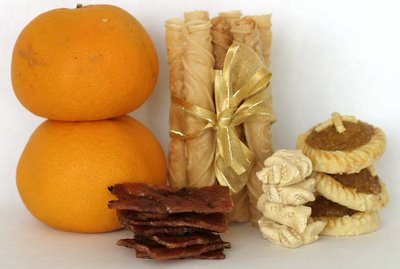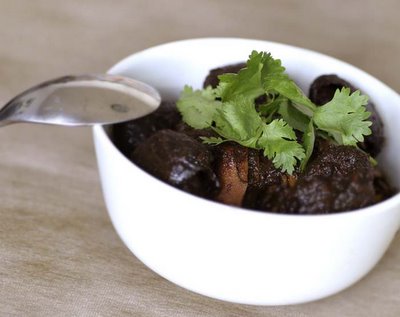
Given that we are intrinsically Chinese, you'd think that Chinese New Year would be a grand affair. And it some ways, it is. On the night of the Eve, our immediate family (meaning mum, dad, brothers and I) sits down for our traditional Reunion Dinner, which seems relatively frugal compared to our Christmas shindigs. On the table is a giant plate of yu sheng (raw fish salad), which represents luck and prosperity; a vegetable dish made slippery with fish maw (the stomach lining of fish, another traditional Chinese New Year ingredient); and another meat dish, which bears little symbolism except to satiate our carnivorous tastes. Over the next two days, family members will drop by my mother's house to pay their respects to their elders (meaning my dad and her) and partake of her famous Nonya specialties that includes kueh pie tee, a dish of shredded turnip and bamboo shoots stewed in a dark soy prawn and pork broth, which you put into fried flour cups and top with a single prawn, coriander leaves and vinegar-spiked chilli sauce. Alas, so famed is this dish in my mother's house that we ran out after the first day and thwarted all plans I had to photograph a few on the second (less busy) day.
Like Christmas, we have our favourite traditional cookies and sweet meats at Chinese New Year. Some of my favourites include pineapple tarts made by my mum and C's mum (they are both different; my mum's version is larger and more crispy, while C's mum's are smaller and melt in your mouth); love letters (thin tuille-like cookies rolled like cigars), my mum's famous kueh bangkit (melt-in-your-mouth coconut milk cookies of which she sells more than 80 bottles every festive season); and of course, bak kwa (barbequed pork jerky for which you have to brave long queues to acquire during the Chinese New Year period).

Another traditional Peranakan festive dish is Buah Keluak. In appearance, the Buah Keluak resembles a Brazil nut. When raw, the insides of the nut are a pale cream colour. But once cooked, a good buak keluak turns oily and black like tar. Yes, tar. Indeed, like the durian, buah keluak is an acquired taste. It is bitter and very robust, and lends its ebony hue to the curry it is cooked in. Most people know the dish as Ayam Buah Keluak (which means Chicken Buah Keluak). In fact, many Peranakan restaurants and homes only serve Ayam Buak Keluak, in which the black insides of the nuts are scraped out and then mixed with minced chicken before being shoved back into the nutshells and cooked as a curry. However, really authentic Buah Keluak is cooked with pork ribs and the insides of the nuts are served neat, in all their bitter glory. The resulting curry is literally black, with a slight orangey sheen of oil that you either love or hate. This is the way my mother cooks it. If you so much as suggest that she tone down the nuts with the addition of minced chicken, you run the risk of her chasing you out and banning you from her house forever more.
Personally, I am no fan of the dish. As proudly Peranakan as I am, I've never acquired a taste for the black gastronomic tar. I do, however, love the taste of its curry gravy. When we were kids, my mum would save the gravy for us and serve it at breakfast to be mopped up with a few sticks of you tiao (fried dough fritters). Like otak toast, this is yet another Peranakan breakfast of champions that made my childhood that much more special.
I still have a bowl of my mum's Buah Keluak sitting in the freezer in anticipation of the weekend, when I will spend a lazy Saturday morning soaking you tiao in its rich, black gravy and pondering how one can love and dislike a dish with such passion at the same time.
No comments:
Post a Comment